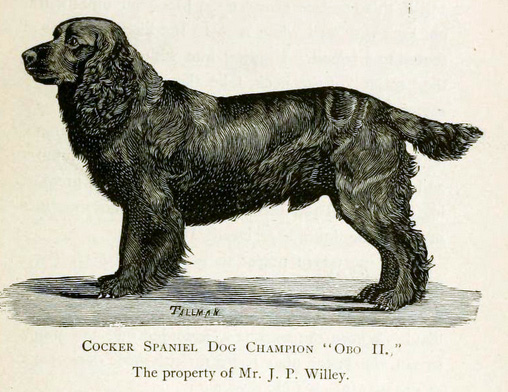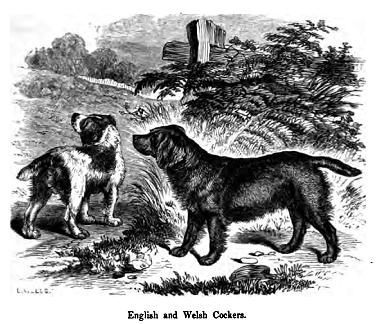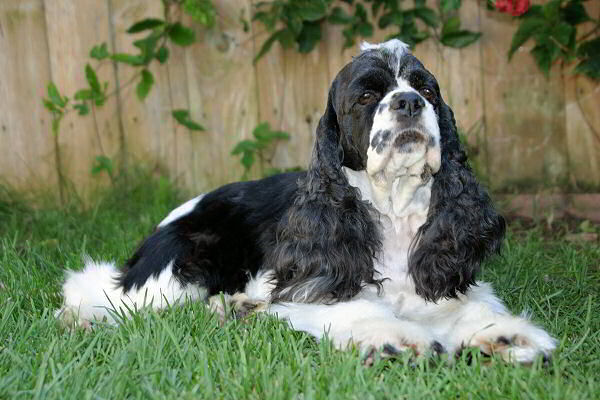Cocker Spaniels are dogs belonging to two breeds of the spaniel dog type: 1)the American Cocker Spaniel and the 2)English Cocker Spaniel, both of which are commonly called simply Cocker Spaniel in their countries of origin. In the early 20th century, Cocker Spaniels also included small hunting spaniels.
Cocker Spaniels were originally bred as hunting dogs in the United Kingdom, with the term “cocker” deriving from their use to hunt the Eurasian woodcock. When the breed was brought to the United States, it was bred to a different standard, which enabled it to specialize in hunting the American woodcock. Further physical changes were bred into the cocker in the United States during the early part of the 20th century.

Spaniels were first mentioned in the 14th century by Gaston III, Count of Foix in his work the Livre de Chasse. The “cocking” or “cocker spaniel” was a type of field or land spaniel in the 19th century. Before 1901, Cocker Spaniels were only separated from Field Spaniels and Springer Spaniels by weight. Two dogs are considered to be the foundation sires of both modern breeds, the English variety is descended from Ch. Obo, while the American breed descends from Obo’s son, Ch. Obo II. In the United States, the English Cocker was recognized as separate from the native breed in 1946; in the UK, the American type was recognized as a separate breed in 1970. Also, the second strain of English Cocker Spaniel, a working strain, is not bred to a standard, but working ability. Both breeds share similar coat colours and health issues with a few exceptions.
History

While their origins are unknown, “spaynels” are mentioned in 14th-century writings. They are commonly assumed to have originated in Spain, and Edward, 2nd Duke of York in his 15th-century work The Master of Game introduces them as “Another kind of hound there is that be called hounds for the hawk and spaniels, for their kind cometh from Spain, notwithstanding that there are many in other countries.” The Master of Game was mostly an English translation of an earlier 14th century Old French work by Gaston III of Foix-Béarn entitled Livre de Chasse.
In 1801, Sydenham Edwards wrote in Cynographia Britannica that the “Land Spaniel” is divided into two types: the hawking, springing/springer and the cocking/cocker spaniel. The term “cocker” came from the dog’s use in hunting woodcocks. During the 19th century, a “cocker spaniel” was a type of small Field Spaniel; at the time, this term referred to some different spaniel hunting breeds, including the Norfolk Spaniel, Sussex Spaniel, and Clumber Spaniel. While no Sussex Cockers or Clumber Cockers existed, some dogs were known as Welsh Cockers and Devonshire Cockers.
Before the 1870s, the only requirement for a dog to be classed as a Cocker Spaniel was that it needed to weigh less than 25 pounds (11 kg), although breeders separated the cocker from King Charles Spaniel, which remains a smaller breed of spaniel. This maximum weight limit remained on the Cocker Spaniel until 1900, with larger dogs being classed as Springer Spaniels. The colours of the Devonshire and Welsh Cockers were described by John Henry Walsh under the pseudonym Stonehenge in his book The Dog in Health and Disease as being a deeper shade of liver than that of the Sussex Spaniel. Following the formation of The Kennel Club in the UK in 1873, efforts were made by breeders to record the pedigrees of cockers and springers. In 1892, English Cocker Spaniels and English Springer Spaniels were recognized as separate breeds by The Kennel Club.
Two dogs are thought to be the foundation sires of both modern breeds of cocker spaniels. Ch. Obo is considered by breed enthusiasts to be the father of the modern English Cocker Spaniel, while his son, Ch. Obo II, is considered to be the progenitor of the American Cocker Spaniel. Obo was born in 1879 when registration as a cocker was still only by size and not by ancestry. He was the son of a Sussex Spaniel and a Field Spaniel. Although Obo was an English dog, Obo II was born on American shores – his mother was shipped to the United States while pregnant. During his lifetime, Obo II was claimed in advertisements to be the sire or grandsire of nearly every prize winning cocker in America.
